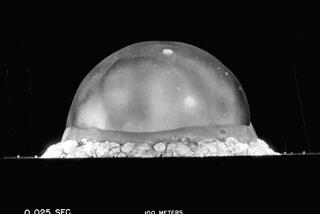You Say You Want an Evolution?
- Share via
The gene is hot stuff these days. Long before the first draft of the human genome was published last winter and thrust us into the Age of the Genome, the gene has been used to explain a whole raft of human facts of life: susceptibility to malaria or AIDS; traits like adventurousness and shyness; homosexuality; obesity; the inexplicable competing urges toward fidelity and straying.
Now come two books by two of the most highly regarded science writers in England, both eager to add their voices to the international paean to the double helix. (And this doesn’t even count the recently published “Life Script” by Nicholas Wade or “Dinner at the New Gene Cafe” by Bill Lambrecht.) Each has taken a familiar biological argument and recast it, with differing degrees of success, entirely in terms of the gene.
In the first, Colin Tudge, author of such notable books as “The Variety of Life” and “The Second Creation,” offers a concise history of the early days of genetics that culminates in a defense of the controversial field of evolutionary psychology (the newer, less-inflammatory term for “sociobiology,” which caused an uproar when introduced by Harvard zoologist E.O. Wilson a generation ago and was immediately branded racist, reductionist and evocative of all the worst notions of eugenics and the quest for genetic purity). “The Impact of the Gene” thus becomes two books, one about the past and one about the present, with the gene providing explanatory power for a contemporary field that Tudge practically takes on faith.
In the second book, Mark Ridley (no relation to his countryman and fellow science writer Matt Ridley, author of the wildly popular “Genome”), a professor of zoology at Oxford, argues that the evolution of complex animals was by no means inevitable, is in fact counterintuitive and can best be understood in terms of the four-letter code of DNA. He borrows his title, “The Cooperative Gene,” from the idea of a “selfish gene” first propounded by Richard Dawkins, who made the case that not only is a chicken merely an egg’s way of making another egg (a phrase usually attributed to Samuel Butler), but that all of us, no matter how complex or talented or beloved, are merely DNA’s way of making more DNA.
“If the business of life is to copy genes,” Ridley writes, “most of our physiology suggests a loss of focus during evolution.” By this he means not that Dawkins is wrong, but that the “selfish gene” idea is insufficient to explain how life evolved from simple, one-celled beings to the complex, highly organized living systems that walk on, swim under or fly above the Earth.
“The evolution of complex life required a mechanism of inheritance with an inherently random component,” Ridley writes. “Somewhere between the bacteria and us--perhaps at about the stage of simple worms--God did have to start to play dice.” So he creates a little mascot, “Mendel’s demon,” to help explain the rules of that celestial crapshoot. Calling it “Mendel’s demon” is, of course, Ridley’s nod to Gregor Mendel, the so-called father of genetics, because Mendel recognized that the units of heredity are randomly reshuffled every time a new generation is created.
The theorized behavior of “Mendel’s demon,” however, isn’t demonic in the least. According to Ridley, it’s “a law-enforcing kind of demon. It redirects the laws of biology to a more creative, rather than destructive, direction.” In effect, it imposes order on a chaotic process, taking the form, ultimately, of increasing complexity.
Ridley focuses his argument about the evolution of complexity on a few crucial points: copying errors in the transcription of DNA and how they are passed on; natural selection and how it acts on offspring with genetic mistakes; and the evolution of sex. But despite Ridley’s lighthearted touch, reading his book can be pretty tough going.
“The Impact of the Gene” is easier to read. The first half is a quick overview of the history of genetics, devoted primarily to retelling the little that’s known about Mendel, a Moravian monk who spent seven years conducting research on inheritance patterns in pea plants, presented his results in a two-part lecture in 1865 and was promptly forgotten. Mendel died in 1884 thinking his conclusions about inheritance must have been wrong--but it turned out he was merely ahead of his time.
In 1900, his original paper was rediscovered, and scientists had amassed sufficient insight by this time to see it for what it was: a brilliant and clear demonstration of the existence of discrete units of heredity, which within a few years would be known as genes.
Tudge tells this story in clear if sometimes plodding prose, hewing throughout to the interpretation of a single Mendel biographer, a geneticist from the town of Brno now in the Czech Republic, where Mendel’s monastery still stands. Tudge presents his hero as a genius on the order of Galileo, Newton and Darwin; “his experiments with peas,” he writes, “were beautifully designed, wonderfully modern in concept, and rooted in a deep understanding of the problems--problems that now seem difficult to envision largely because Mendel solved them.”
Unfortunately, what’s missing here is a sense of the lively debate that’s been going on for nearly a century about just how much of a genius Mendel really was, and whether he deserves to be known as the father of genetics. The details of Mendel’s life are in many ways a mystery, since he left behind few papers. But Tudge chooses to fill in the blanks in sometimes perplexing ways. He insists, for instance, that Mendel was a “confidant” of some of the most notable figures in European science of his day, a man who was “indeed well connected” and “close to the action.” In my own view, Mendel was an outsider, isolated by language, geography, background and temperament, which is what made it so hard for him to get a hearing for his discovery--especially because it went against the conventional wisdom that heredity was the “blending” of maternal and paternal traits.
Tudge’s book is plagued by anachronisms, such as when he says that Charles Darwin noted a “Mendelian ratio” in certain family trees--even though Darwin had never heard of Mendel. It’s plagued by repetition, too, like his frequent assertions of what makes an experiment “elegant” or who really coined the phrase “survival of the fittest” (hint: it wasn’t Darwin). It’s almost as if Tudge doesn’t expect his readers to be paying attention.
In “The Impact of the Gene” and “The Cooperative Gene,” the final chapters are devoted to a bit of free-form speculation about what our evolving knowledge about genetics implies for the future, or for a new interpretation of the present. For Tudge, the whole point of telling his tale seems to be to make a case for evolutionary psychology. He spends a lot of time defending some premises that 30 years ago caused a great howl from the political left protesting what it interpreted as genetic determinism: that genes underlie much human behavior, that even acts of altruism and self-sacrifice can be ascribed to the “selfish gene,” that we behave the way we do because it was adaptive at one time in our species’ history and that different behavioral strategies can be quantified, measured and compared.
His discussion of these four premises is clear and interesting but marred by the chip on his shoulder that he reveals in the very first chapter of “The Impact of the Gene,” in which he alludes to the highly politicized nature of these arguments in the heyday of sociobiology. “The vociferous critics of evolutionary psychology should do some homework,” he writes, “to find out what it is really about. If they did, they would surely be ashamed of their own obduracy.”
As for Ridley, his speculative chapters are more fun and less defensive. In his view, the only thing that has kept humans from evolving to an even more complex life form is the genetic mutation rate. The complexity of a species is the result of an evolutionary equilibrium between the mutation rate (which increases as the number of genes increases) on the one hand, and correcting mechanisms like proofreading enzymes and sexual reproduction on the other.
If the mutation rate can be reduced--by routinely freezing young girls’ error-free eggs for use later when they’re ready to reproduce, for example, or by using gene therapy to correct those mutations that do slip by through gene therapy--then the sky’s the limit in terms of life’s complexity.
Ridley imagines a future in which the human species contains within its DNA codes for other organisms that are held in reserve, to be “called up as appropriate.” If earthly conditions change, through nuclear winter or a denuded ozone layer or “fire and brimstone,” then a whole new species, descendants of humans but no longer humanoid, can “reinvent themselves as fire-adapted flowers and cover the scorched earth with fresh foliage. After the deluge, they will grow up as fish, and swim safely beneath the waves. And when the last trump sounds, they will express the genes for sinlessness, and their ten-thousand-million-gene vessels of cooperating and error-conquering DNA will glide down the rivers of Paradise into eternity.”
This is a grandly optimistic view of the post-apocalypse, one that the author might not even believe now in light of the events of recent months, but for the moment it is one from which to take a certain measure of comfort. Should “the deluge” come, it may take a few billion years before life on Earth reemerges, but reemerge it will. And it will do so, as it did before, with a staggering degree of ingenuity, variety and sophistication.
*
Robin Marantz Henig is the author, most recently, of “The Monk in the Garden: The Lost and Found Genius of Gregor Mendel.”






